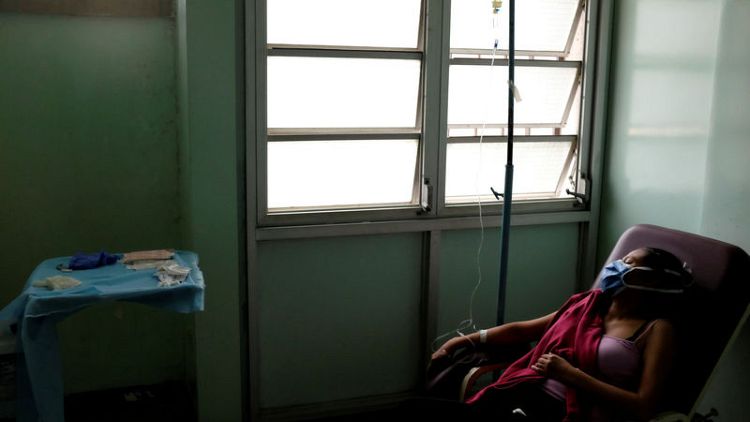By Vivian Sequera
CARACAS (Reuters) - After a woman died while connected to a respirator at a hospital in central Venezuela last month, one of her relatives punched the attending doctor in the chest, blaming her for the woman's death.
"They think when there's no equipment or antibiotics that it's the doctor's fault," said the doctor at the Hospital Central in Maracay, 130 kilometres (80 miles) west of the capital Caracas. She requested anonymity for fear of reprisals.
Hospital Central was one of 62 percent of hospitals across the country where doctors say they have suffered attacks by frustrated patients' relatives, as violent acts in Venezuela's decaying medical system have become increasingly common, according to a study published on Thursday by a doctors advocacy group.
In addition, 45 percent of hospitals reported robberies and shootings, the report showed, in the latest sign of how Venezuela's five years of recession have left the country's hospitals, once among the best in Latin America, in dire straits.
Water shortages have forced surgeons to forego operations because they cannot wash their hands, among the most basic of anti-infective precautions. A lack of medicine to prevent organ rejection has left transplant recipients suffering organ failure. And epileptic patients are struggling with seizures due to drug shortages.
But the latest study released by the group, Doctors for Health, shows that hospitals are also suffering from a crime wave in a country with one of the world's highest murder and kidnapping rates.
Based on a survey of doctors at 40 large hospitals across the country, the study did not ask for details about violent incidents. But many likely had to do with the lack of medicines and proper equipment, according to Julio Castro, one of the Doctors for Health leaders.
"That usually happens when a parent comes with their asthmatic child, for example, and the doctor has to tell them that there is no medicine," Castro said. "The situation has been getting worse over time, even in just the past couple of months."
Another problem is that many public hospitals are located in dangerous neighbourhoods, where clashes between rival gangs are common, Castro said.
Doctors for Health was formed in 2014 by physicians, including some who are members of the opposition-led National Assembly, to draw attention to what they saw as a deteriorating health system under socialist President Nicolas Maduro, and to collect data in the absence of official statistics.
Venezuela's Information Ministry did not respond to a request for comment. Maduro has said crime statistics published by opposition-linked groups exaggerate the extent of criminality to spread paranoia, while he blames an "economic war" by the United States and Venezuelan elites for the country's woes.
This year marked the first time the poll asked doctors about the security situation.
The study also found that half of hospitals suffered from water and electricity cuts and lacked X-ray machines, while 42 percent lacked working ultrasound devices.
(Reporting by Vivian Sequera; Writing by Luc Cohen; editing by Bill Berkrot)
